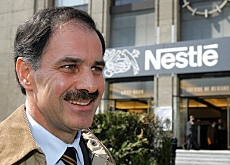How ethics can shape business

Swiss multinationals such as food giant Nestlé or technology concern ABB have been moving towards more ethical business practices.
But when profits alone are decisive for so called ethical business practices, it is the law of the jungle that applies, says business ethics expert Ulrich Thielemann in an interview with swissinfo.
Thielemann is deputy director of the Institute for Business Ethics at St Gallen University.
swissinfo: Is business ethics just a buzzword?
Ulrich Thielemann: Business ethics has been booming for ten years, especially in the form of corporate ethics. Big banks and other big companies are increasingly claiming that they are operating in an ethically responsible way.
They use terms such as corporate responsibility, corporate citizenship and sustainability when they talk about their ethics measures. In this way they are exposed and lay themselves open to public criticism.
swissinfo: Why do companies do that?
U.T.: Despite – or probably because of – globalisation, companies are still moving in the public domain and need the support of stakeholders, employees and clients. The public expects companies to act in a responsible way.
swissinfo: Why should bosses care about the wellbeing of their employees, when they hardly ever meet them?
U.T.: From an ethics point of view, the reason is that employees have a legitimate right to be treated in a decent or fair manner.
swissinfo: It is not easy to measure ethics. How can you define fair pay?
U.T.: Fairness is a central point of business ethics. It’s based on how to interact in a fair way, on the justice of individual achievements and on achieving a fair distribution of the burden.
You might question whether the recent massive increases in managers’ salaries and the fact that they claim to be mainly responsible for creating economic value could be seen as fair.
swissinfo: Are these salaries justified?
U.T.: Today some managers earn more than several hundred times more than the average. I don’t see how this can be justified.
It is highly implausible to talk about the justice of individual achievement here.
swissinfo: How do Swiss firms compare internationally in terms of business ethics?
U.T.: They are extremely ambivalent. On the one hand, ethically responsible consumption in Switzerland is more commonplace than in other countries. One only has to think of the big distributors competing over ethics. On the other hand, Switzerland is home to many multinationals that are very heavily criticised in public.
swissinfo: How strongly established is ethics in the economy?
U.T.: It started on a voluntary basis and now there is no going back. However, we need to continue to strengthen the dynamics of critical debate between companies and society.
It requires a framework that would be in addition to and support this process, and nowadays this would have to be globally targeted.
swissinfo: Should politicians step in?
U.T.: Urgently, because nation states and democracies have lost a huge amount of sovereignty. Instead of a bastion of freedom, the market economy enslaves rather than frees the individual.
It almost seems as though the only thing left for people to do is to make themselves attractive to global investors – and Switzerland scores well here.
swissinfo: In what way?
U.T.: The Swiss practice of failing to render judicial assistance in tax matters where foreign citizens are effectively invited to deposit their money in Switzerland is parasitic.
The country takes it upon itself to free people and companies from taxes. This is rather a massive intrusion on other states’ sovereignty.
swissinfo-interview: Susanne Schanda
St Gallen University has had a business ethics research unit since 1983.
In 1987 it created the first such university chair in a German-speaking country.
The current Institute for Business Ethics was founded in 1989. Financially independent, it depends largely on funding from companies, federations and public agencies.
Ulrich Thielemann was born in Remscheid, western Germany, in 1961 and studied economics in Wuppertal.
He is deputy director of the Institute for Business Ethics, St Gallen University.
He co-authored the study, Ethics and Success, with institute head Peter Ulrich.
With his economic-ethical approach, Thielemann has turned against established market economic theories and the increasing economisation of all possible aspects of daily life.
For his doctorate he examined the justification theories of the markets and of competition.
The 5th International Alpine Symposium is taking place in Interlaken on January 16-17 and will be focusing on business energy and business ethics.
Economists, scientists, politicians and big names from culture – including Sir Bob Geldof, DJ Bobo and Bertrand Piccard – will give presentations and discussions on “Business Energy – Business Ethics”.
The symposium is seen as a conference for widening the skills and knowledge of innovative entrepreneurs.
The event is supported by numerous Swiss small and medium-sized companies. The aid organisation World Vision is the symposium’s first charity partner.

In compliance with the JTI standards
More: SWI swissinfo.ch certified by the Journalism Trust Initiative











You can find an overview of ongoing debates with our journalists here . Please join us!
If you want to start a conversation about a topic raised in this article or want to report factual errors, email us at english@swissinfo.ch.